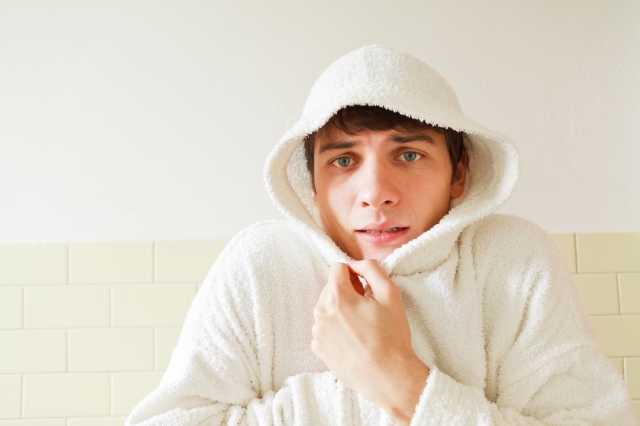
“I am about 8 months out of treatment for head and neck cancer,” says one survivor on Cancer Compass, “and along with other things, I cannot get warm! I’m freezing no matter what the temperature is. Has anyone else experienced this cold all the time after treatment?”
“I’m always cold too,” says another survivor on csn.cancer.org, “and it’s definitely been since treatments started.”
Is it possible that cancer treatments can affect how we experience temperature? A lot of survivors seem to think so, so I decided to look into it. Seems there are a lot of reasons a person can experience more cold than usual. Below are a few, along with some coping techniques.
Iron deficiency: If you’re not getting enough iron, or if you’re body is unable to process it as well as usual, you could be experiencing an iron deficiency, which can make you feel cold. Iron plays a role in regulating body temperature and carries oxygen throughout the body. If you’re iron deficient, you may also tire easily. Colon cancer can cause the condition, but so can an unbalanced diet, insufficient vitamin C, peptic ulcers, and even vegetarianism. Your doctor can test for the condition, and then assist you with treatment.
Sweating: If you’re perspiring more than normal, that can also contribute to a colder feeling. Sometimes treatments or side effects can cause extra sweating, particularly if you’ve been thrown into early menopause. Some women experience “cold flashes” during treatment in a similar manner to the typical hot flashes. Other times, the sweating can be a separate reaction to the medications. Check with your doctor, then get used to taking an extra shirt around with you so you can change out of damp clothes and avoid getting too chilled.
Circulatory issues: Blood flow gives you that feeling of warmth throughout your body, so if you’re feeling cold, it could be that your blood isn’t circulating as efficiently as it should. Thyroid conditions can sometimes cause this-the thyroid is responsible for releasing a hormone that’s used in regulating the body’s use of energy and vitamins. If it’s not producing enough of that hormone, you may feel cold. (Other symptoms include weakness, depression, and dry, scaly skin.) According to the University of Maryland Medical Center, some drugs used in chemotherapy, like Sunent or Gleevec, can cause or worsen hypothyroidism.
Raynaud’s disease also affects circulation, causing small blood vessels to narrow, particularly in the hands and feet. Certain drugs used in chemotherapy have also been linked with Raynaud’s.
Low blood platelets: If treatment has lowered your white blood cell count, that may explain why you feel cold. Platelets are one of the three kinds of blood cells that circulate oxygen throughout the body. If you don’t have enough of them, your body doesn’t get enough oxygen, which means you can develop anemia-which causes you to feel cold, among other things.
Weight: Body size and shape affect how you respond to cold climates. If you’ve lost a lot of weight through treatment, that could be why you’re feeling colder. Larger body masses produce more heat. Particularly if you’ve lost both fat and muscle, you’ve given up a significant portion of your insulation, so to speak, and your body will respond by feeling colder.
Of course, these aren’t the only reasons you may be feeling colder than usual. Causes vary from person to person, depending on your treatment and your overall health condition. The point is that treatment can affect body temperature, and several survivors have experienced it. Talk with your doctor, and try these coping techniques:
- Get used to wearing layers. Try one of the many brands of light long underwear under your clothes, and take an extra sweater or jacket with you wherever you go. (Nothing beats wool for real warmth!) Consider also stocking up on hats, scarves, and gloves. Silk socks under your regular socks can help keep your feet warm during cold days.
- Wear socks and gloves to bed if it makes you more comfortable. You can also try a warm foot bath before bed.
- Take a personal heater with you to work.
- Exercise daily if you can. Exercise encourages blood circulation, which can help you feel warmer for hours afterward.
- Consider getting an electric blanket or electric throw for snuggling in your bed or living room.
- Preheat the car before you leave the house-start it up and let it run for about five minutes (make sure to open the garage door to air out the exhaust).
- Humidity holds heat, so if you live in a dry area, install a humidifier in your bedroom, or anywhere in your house that you want to feel more comfortable.
- Try a canopy bed. Having some sort of material enclosing you overnight will help hold in heat to keep you warmer.
Do you feel cold all the time after treatment? Please share any tips you may have.
Photo courtesy graur razvan ionut via freedigitalphotos.net.

